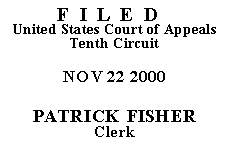

| MARK LOWE LUTHER,
v.
RICHARD SOARES and THE
ATTORNEY GENERAL OF THE
STATE OF COLORADO |
No. 00-1164
(D.C. No. 00-Z-615) (D. Colo.) |
Luther is currently a prisoner in the Colorado state system. He pleaded guilty to manslaughter in August 1995 and was sentenced to eighteen months' imprisonment and three years of mandatory parole. He served the prison term, but then violated the conditions of his parole by leaving Colorado. Luther was rearrested and pleaded guilty in July 1997 to attempted escape. His parole on the manslaughter charge was revoked, and he was also sentenced to three years' imprisonment and three years of parole on the escape charge, to run consecutively to the manslaughter charge.
Luther alleges that he was made to serve out the remainder of the manslaughter charge before starting to serve the escape charge. He argues that this has forced him to serve a separate period of parole for each conviction, in violation of Colo. Rev. Stat. § 18-1-105(1)(a)(V)(E). Luther raised this issue in the state courts, however, only in a motion for a writ of mandamus in the Colorado Supreme Court. That court denied the motion summarily.
Luther then filed an application for a writ of habeas corpus in the federal district court, arguing that the state's failure to release him on parole violated his Fourteenth Amendment rights. The district court denied relief because Luther's motion for mandamus did not exhaust his state remedies as required by 28 U.S.C. § 2254(b)(1). Assuming that Luther was now procedurally barred from presenting his arguments to the state courts, the district court found that Luther had not shown either an adequate cause for his default or a fundamental miscarriage of justice. The court also denied Luther's requests for a certificate of appealability and leave to proceed on appeal in forma pauperis.
Luther filed his application under 28 U.S.C. § 2254, but because he is challenging the execution of his sentence, we construe it under 28 U.S.C. § 2241. See Montez v. McKinna, 208 F.3d 862, 865 (10th Cir. 2000). We require a certificate of appealability for appeals by state prisoners of § 2241 petitions. See id. at 867. Without a certificate of appealability, we may not consider this appeal. See 28 U.S.C. § 2253(c)(1). For substantially the reasons stated by the district court, we DENY Luther's request for a certificate of appealability. To the extent that Luther presents new arguments that he did not submit to the district court, such as that he is actually innocent of the underlying crime, we decline to address them. See Talbott v. Ferguson, No. 97-8091, 1998 WL 123061, at *3 n.8 (10th Cir. Mar. 4, 1998) (citing Walker v. Mather (In re Walker), 959 F.2d 894, 896 (10th Cir. 1992)). We also DENY Luther's motion to proceed in forma pauperis. We therefore DISMISS his appeal.
ENTERED FOR THE COURT
David M. Ebel
Circuit Judge
*.After examining appellant's brief and the appellate record, this panel has determined unanimously that oral argument would not materially assist the determination of this appeal. See Fed. R. App. P. 34(a)(2) and 10th Cir. R. 34.1(G). The case is therefore ordered submitted without oral argument. This Order and Judgment is not binding precedent, except under the doctrines of law of the case, res judicata, and collateral estoppel. The court generally disfavors the citation of orders and judgments; nevertheless, an order and judgment may be cited under the terms and conditions of 10th Cir. R. 36.3.